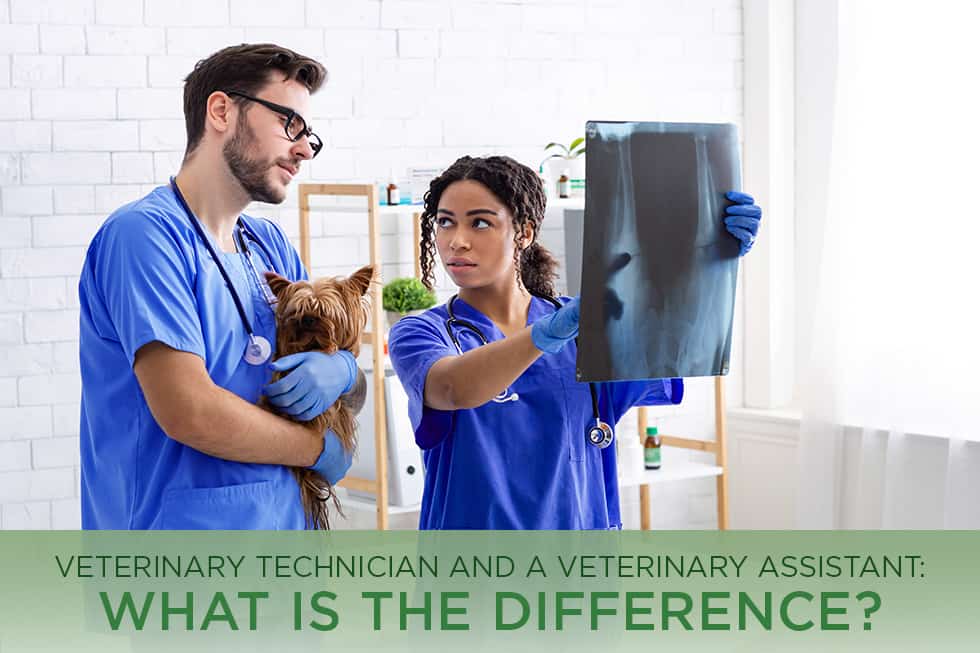Anyone who chooses a career with animals is a special hero. Without a doubt, veterinary medicine would be very different without the role of a licensed veterinary technician. Working with hamsters to horses, licensed veterinary technicians know the why behind what they are doing, working side by side with the veterinarian. Considering a career in the veterinary field? Learn the difference between a veterinary technician and veterinary assistant in our blog.
LVT, CVT, RVT – what do these letters mean?
Licensed Veterinary Technician, Registered Veterinary Technician, Certified Veterinary Technician – These titles are interchangeable by state. If your animal nurse has these letters behind their name, they have been educated on the animals and disease processes and how to treat the animal. They graduated with a degree and have passed a national exam. Licensed veterinary technicians are truly the right hand of a veterinary doctor. While some of the duties of a veterinary assistant and a vet tech may overlap, the licensed veterinary technician receives much more clinical training and can provide a wider range of services and care under the direction of a veterinarian. Some of those services include:
- Administration and Dispensing medication
- Providing general or surgical nursing care to sick or injured animals
- Performing checkups
- Monitoring patients on anesthesia
- Laboratory Procedures: Specimen Management and Specimen Analysis
- Taking and processing x-rays
- Client communication
- And so much more
What is a Veterinary Assistant’s Role in a Vet Practice?
Many veterinary assistants begin their careers through on-the-job training. Veterinary assistants help with the efficiency of patient care to allow licensed veterinary technicians to focus on their specific skills in patient care. A veterinary assistant might clean cages and exam rooms and help with feeding and caring for animals. In some vet practices, veterinary assistants may perform some general clinical duties, but there is an important distinction between what a veterinary assistant is qualified to do and what a licensed veterinary technician can perform. The veterinary assistant usually works under a licensed veterinary technician, who works directly under the veterinarian.
Certification and Education
The primary differences between a veterinary assistant and a licensed veterinary technician center around the education for each role. Many veterinary assistants are trained on the job, some may attend a veterinary assisting program for a certificate, that takes less than a year to complete. While a Licensed Veterinary Technician program is more comprehensive and prepares students for the national board exam.
For example, the 24-month Veterinary Technology Program at MedQuest College students receive an Associate of Applied Science and are prepared to take the Veterinary Technology National Examination (VTNE) through the American Association of Veterinary State Boards (AAVSB). Upon successful completion of the national examination, graduates are eligible to submit for licensure by the Kentucky Board of Veterinary Examiners (KBVE).
Better Compensation and More Opportunities
While most go into the field for the love of animals there is always a concern about compensation. While the training to become a licensed veterinary technician is a bit longer, there are tangible benefits to pursuing a career as a licensed veterinary technician vs a veterinary assistant, and the big one – is compensation. The pay range between a veterinary assistant and a licensed veterinary technician is substantial, sometimes a difference of up to $30,000 per year. Not to mention the increased number of opportunities you may have access to as a licensed vet tech.
- Specialize in a department such as anesthesia or internal medicine
- Employment at a Biomedical research facility
- Employment at a diagnostic laboratory
- Teaching
- Veterinary supply sales
Deciding on a career path is always a tough decision. But choosing a career that allows you to turn your passion for animals into what you do for a living – is surely going to put you on the path to a fulfilling and rewarding future. If you’d like to learn more about the Veterinary Technology Program at MedQuest College, contact us today! MedQuest is helping students launch careers in the world of veterinary technology with valuable hands-on training through an externship in a variety of real-world clinical settings and job placement assistance upon graduation. We cannot wait to see you learn to be able to help the animals and fulfill a dream of yours. Call now for more information or complete the online form and we’ll reach out to you.

